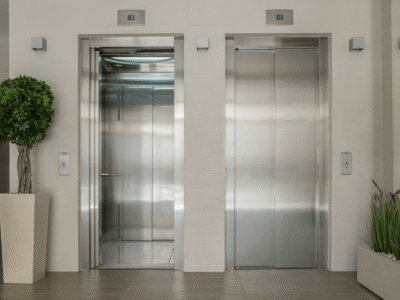
Elevators are essential to daily life for thousands of Bronx residents, especially in high-rise apartment buildings.
Unfortunately, poor maintenance, mechanical failures, and neglect by property owners can turn these necessary conveniences into serious hazards, leading to an elevator injury that can result in lasting physical harm and complex legal challenges.
At Wingate, Russotti, Shapiro, Moses & Halperin, LLP (WRSMH), we help injured tenants understand their rights and pursue full compensation when building owners fail to uphold their legal responsibilities.
This guide explores common NYC Housing Code elevator violations, the legal obligations of landlords, and what steps you can take if you’ve been hurt due to elevator maintenance neglect.
Understanding NYC Housing Code Elevator Requirements
In New York City, the Department of Buildings (DOB) enforces strict standards for elevator safety and operation under the NYC Housing Maintenance Code and Building Code. Landlords and property managers are required to:
- Schedule and complete annual inspections
- Perform routine maintenance and repairs
- Keep detailed maintenance logs
- Remove malfunctioning elevators from service until fixed
- Post required notices about inspections and outages
Failure to meet these obligations can result in DOB violations and fines. More importantly, these violations can create dangerous conditions for tenants who depend on safe, working elevators.
Common Elevator Violations in Bronx Residential Buildings
In our work representing injured tenants across New York City, we frequently encounter violations such as:
- Failure to perform regular inspections
- Malfunctioning emergency brakes or door sensors
- Elevator doors that do not close or open properly
- Uneven stops between floors
- Failure to address recurring service outages
- Inadequate signage about elevator shutdowns
Common Injuries from Elevator Malfunctions
When property owners and management companies delay or avoid necessary maintenance, it leads to catastrophic injuries:
- Broken bones or fractures from abrupt falls
- Head trauma due to sudden stops or impacts
- Spinal cord injuries from drops or jolts
- Crush injuries from defective doors
- Lacerations or contusions from mechanical failures
- PTSD or anxiety from traumatic elevator incidents
- Mobility setbacks for elderly or disabled individuals
Landlord Elevator Liability in the Bronx
Under New York law, landlords have a legal duty to maintain all common areas, including elevators, in a reasonably safe condition. When a landlord ignores this duty, and a tenant or guest is injured, they may be held financially responsible for resulting damages. This is known as premises liability.
A landlord may be liable for the full cost of your medical bills, lost income, and pain and suffering if they:
- Knew or should have known about an elevator issue
- Failed to make timely repairs
- Violated NYC Housing Code elevator requirements
At WRSMH, we thoroughly investigate the history of building violations, service requests, and maintenance records to hold negligent property owners accountable.
What to Do After a Bronx Elevator Injury
If you’ve been injured due to a faulty elevator in your apartment building, take the following steps:
- Get Medical Attention: Your health and safety come first. See a doctor immediately, even if injuries seem minor. Documentation of your injury is key to your claim.
- Report the Incident: Notify your building super or management in writing. If the elevator is still operating, report the issue to NYC 311 and request a DOB inspection.
- Take Photos and Notes: Document the scene, including any visible damage, poor lighting, or signage. Take note of the time, date, and nature of the incident.
- Speak with Witnesses: If anyone saw the incident or has experienced similar problems, get their contact information.
- Call a Bronx Elevator Injury Attorney: Speak with an experienced lawyer who can assess your case, secure evidence, and build a strong tenant injury claim in the Bronx.
The Legal Process: Pursuing a Tenant Injury Claim in the Bronx
When pursuing a tenant injury claim in the Bronx, your attorney will work to:
- Obtain building maintenance and inspection records
- Identify prior elevator violations or complaints
- Consult mechanical and safety experts
- Demonstrate the landlord’s failure to comply with the NYC Housing Code elevator standards
- Calculate the full impact of your injuries, including future care needs
In many cases, these claims can be resolved through negotiations or insurance settlements. However, if your landlord or their insurer refuses to offer fair compensation, we are fully prepared to take your case to trial.
Compensation You May Be Entitled To
If your injury resulted from elevator maintenance neglect, you may be eligible to recover:
- Medical expenses (emergency care, physical therapy, surgery)
- Lost wages or diminished earning ability
- Pain and suffering
- Emotional distress or trauma
- Long-term disability or reduced mobility
Each case is unique, which is why it’s vital to speak with an attorney who understands both the legal and practical aspects of Bronx premises liability law.
How WRSMH Can Help You
At Wingate, Russotti, Shapiro, Moses & Halperin, LLP, we have over 50 years of experience representing injury victims in New York City. Our legal team has recovered over $2 billion for clients and is widely recognized among the best personal injury firms in the region.
Our firm understands the complexities of NYC Housing Code elevator regulations and knows how to build a compelling case against negligent landlords, offering:
- Free, no-obligation consultations
- No fees unless we win your case
- A track record of successful verdicts and settlements
- Skilled investigators and expert witnesses
- Personalized attention every step of the way
Meet With Our Trusted Bronx Elevator Accident Attorneys Today
If you’ve suffered an elevator-related injury in a Bronx apartment building, you don’t have to face it alone. The sooner you speak with one of our Bronx premises liability attorneys, the better your chances of preserving evidence and building a strong case. Call WRSMH at (212) 986-7353 to schedule your free consultation today.